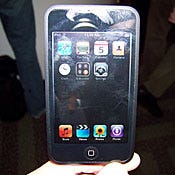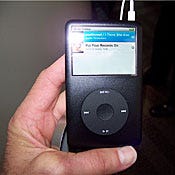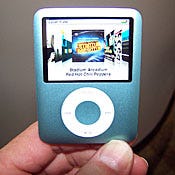The new lineup includes a partnership with Starbucks that will result in free Wi-Fi access in its coffee shops for iPhone or iPod Touch owners who want to download music.

Apple on Wednesday broadened its entertainment ecosystem of hardware, software and services with a new touch-screen iPod, a revamp of its current iPod lineup, and a $200 price cut of its iPhone.
In overhauling its iPod portfolio, which accounts for about three-quarters of the digital music player market, Apple launched upgrades of its two music players, the iPod Shuffle and iPod Nano, while the video iPod was renamed the iPod Classic.
|
|
| |
|
In addition, Apple unveiled a partnership with Starbucks will result in free Wi-Fi access in its coffee shops for iPhone or iPod Touch owners who want to download music.
"They're continuing to suck the air out of the room for a lot of their competitors," Mike McGuire, analyst for Gartner, said of Apple's product lineup for the upcoming holiday shopping season, the busiest time of the year for retailers.
Apple chief executive Steve Jobs unveiled the latest products to reporters and analysts in San Francisco. Speculation about the expected iPod revamp consumed bloggers and Apple fans for about a week, a reflection of how Apple marketing can build hype while staying mum about future releases.
In chopping $200 off the $599 price tag of the 8Gbyte iPhone, Apple also killed off its smaller 4Gbyte version, which had sold for $499. The size of the price cut indicated that Apple recognized that the original cost of the popular combination mobile phone and music and video player was too high for mainstream consumers. "It shows they're listening to the marketplace," McGuire told InformationWeek.
The price cut will also make it more likely that Apple would meet its target of selling 10 million iPhones by next June, which would mark the gadget's first year anniversary. Jobs said the company expects to sell 1 million iPhones by the end of the month. "People will be surprised by the aggressiveness of the cut," Gartner analyst Charles Smulders said. "Apple is very focused on achieving its shipment goals for the iPhone."
In an apparent move to nudge iPod users to the iPhone, Apple launched the iPod Touch, which had many of the same features, including the touch-screen interface. "If you use an iPhone, you'll feel very much at home," Jobs said of the iPod Touch.
|
|
| |
|
While the new device does not have voice communications, it can connect to the Internet through Wi-Fi. The wireless broadband connection is used in many homes and businesses, including Starbucks. For Web browsing, the iPod Touch includes Apple's Safari browser, which is also in the iPhone.
The Starbucks partnership was a good example of how Apple is merging technology and services in an attempt to build an entertainment ecosystem that customers won't want to leave. Apple said an iPhone or iPod Touch user entering one of Starbucks' 5,800 Wi-Fi-enabled coffee shops in the U.S. would see a special icon featuring the company's logo. Clicking on the icon would enable the person to buy the song currently playing in the caf, or a recently played tuned.
Starbucks founder and chairman Howard Schultz, who joined Jobs on stage, is planning a gradual rollout of the service, which will launch first in New York and Seattle on Oct. 2, then in the San Francisco Bay Area Nov. 7. The service would be rolled out in Los Angeles and Chicago in February and March, respectively. By the end of 2008, most of the metropolitan stores would be covered, with all Wi-Fi-enabled stores in the U.S. offering the service in 2009.
Besides using Starbucks to sell more songs through its hardware, Apple also unveiled the iTunes Wi-Fi Music Store, accessible through an icon on the iPod Touch, and as part of an iPhone software upgrade scheduled for later this month. Accessing the store through the gadgets provides a simple interface for searching and buying tunes from Apple's catalog of 6 million songs.
The iPod Touch, which has a 3.5-inch display for photos and video, is scheduled to ship this month. The device will cost $299 for an 8Gbyte version, and $399 for a 16Gbyte version.
|
|
| |
|
Also scheduled to ship in plenty of time for the holiday season are upgrades of the iPod Nano, and the iPod Classic, which previously had been called the video iPod. The Nano, which was only a music player, now supports video on a 2-inch screen with the same resolution as the iPod Classic -- 320 by 240 pixels. New to both devices was the addition of Apple's Cover Flow software, which enables users to scroll through album cover art in searching for an artist. Both gadgets use Apple's familiar scroll wheel interface.
Besides video support, another big change in the Nano was the size. The device is wider, than but about half as long as the older version. The iPod Classic, which is 8 millimeters thick, is slightly thinner than the older version.
Both the Nano and the Classic are scheduled to be in stores this weekend. The Nano will cost $149 for a 4Gbyte version, and $199 for the model with 8Gbytes of storage. The Classic will cost $249 for an 80Gbyte model and $349 for a 160Gbyte version.
Also available in stores by the weekend is the Shuffle, which will be available in new colors. The clip-on version of the iPod, the smallest member of the product line, will cost $79 and have 1Gbyte of storage.
Apple plans to ship Wednesday night an upgrade of its iTunes software for accessing its online store and downloading and organizing music, podcasts, and video. Next week, Apple plans to activate tools that will enable users to take portions of songs purchased through Apple and turn them into ring tones for the iPhone.
Apple will initially have 500,000 songs available for conversion into ring tones, with others added as the company gets licensing rights from copyright holders, Jobs said.
Overall, Apple's latest move reflects how the company continues to effectively turn its hardware, software and services into an entertainment ecosystem that remains ahead of Microsoft, which has the Zune media player and online store, Sony, and other competitors. "This puts a tremendous amount of pressure on Microsoft and anybody else competing in this space," McGuire said.
About the Author(s)
You May Also Like









